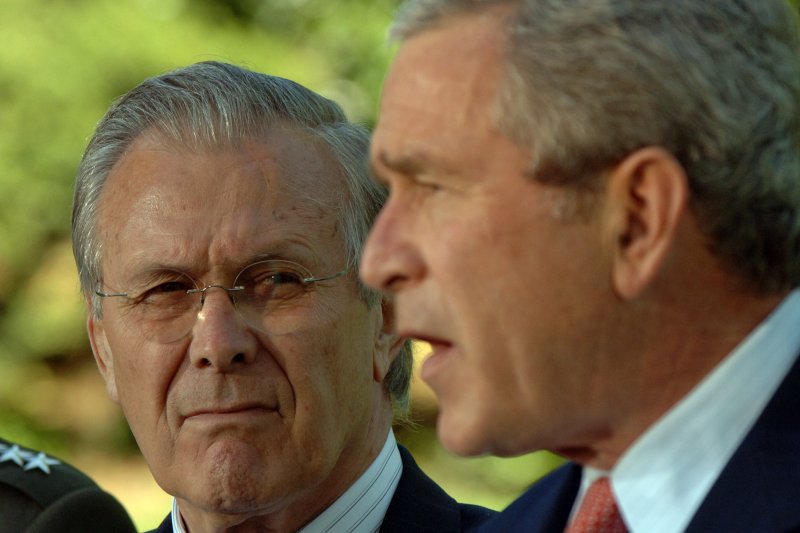1 of 3 | Former U.S. President George W. Bush speaks to the press as former Secretary of Defense Donald Rumsfeld looks on near the Oval Office of the White House, May 1, 2006. In a forthcoming biography, former President George H.W. Bush calls the former Pentagon chief "an arrogant fellow" who was too hawkish in his son's administration. Rumsfeld responded by saying George W. Bush "made his own decisions." Photo by Roger L. Wollenberg/UPI |
License Photo
WASHINGTON, Nov. 5 (UPI) -- In a new biography coming out next week, former President George Herbert Walker Bush offers a scathing review of two of his son's top administration officials -- saying they were hot-headed, jingoistic and did not serve the president well, the author said Thursday.
The advisers in the elder Bush's crosshairs are former Vice President Dick Cheney and Defense Secretary Donald Rumsfeld. The 41st president made the remarks to biographer Jon Meacham during interviews promoting "Destiny and Power: The American Odyssey of George Herbert Walker Bush," due out Tuesday.
Bush's main criticisms are that Cheney pushed foreign policies that were too hard-line, and that Rumsfeld was too hawkish. Bush also said the former vice president carved out his own agenda in the White House during his son's presidency.
"He had his own empire there and marched to his own drummer," Bush said, according to Meacham. "It just showed me that you cannot do it that way. The president should not have that worry."
Bush also says in the book that Cheney changed after the Sept. 11 terrorist attacks -- an assessment Cheney agrees with.
Meacham said the former vice president smiled after reading Bush's comments on him and called them "fascinating." Cheney then said he'd "never heard any of this from 41" but admitted, "No question, I was much harder-line after 9/11 than I was before."
In the book, Bush adds that Cheney, who was his Defense Secretary between 1989 and 1993, was "a good man" but wanted to "fight about everything."
"He just became very hard-line and very different from the Dick Cheney I knew and worked with," Bush, 91, told Meacham. "The reaction to [the Sept. 11 terrorist attacks], what to do about the Middle East... Just iron-ass. His seeming under to the real hard-charging guys who want to fight about everything, use force to get our way in the Middle East."
Bush partly attributed Cheney's political transformation to the former vice president's wife, Lynne, a conservative historian.
"I've concluded that Lynne Cheney is a lot of the éminence grise here -- iron-ass, tough as nails, driving," Bush told Meacham.
On Rumsfeld, Bush said the former Pentagon chief "served the president badly" and that he was an "arrogant fellow."
"I don't like what he did, and I think it hurt the President, having his iron-ass view of everything," Bush told Meacham. "There's a lack of humility, a lack of seeing what the other guy thinks. He's more kick ass and take names, take numbers. I think he paid a price for that."
Despite the criticisms of Cheney and Rumsfeld in the book, Bush supports his son's decision to invade Iraq in 2003 and lauded the overthrow of Saddam Hussein -- the dictator the elder Bush battled with during the first Gulf War in 1991. However, Bush did criticize the language his son used regarding the second Gulf War.
"Hot rhetoric is pretty easy to get headlines, but it doesn't necessarily solve the diplomatic problem," he said, noting particularly the term "axis of evil" -- used to describe Iraq, Iran and North Korea -- that his son introduced during his State of the Union address in 2002. Bush said the phrase, "might be historically proved to be not benefiting anything."
Rumsfeld on Thursday dismissed Bush's criticisms against him in a statement to NBC News.
"Bush 41 is getting up in [age] years and misjudges Bush 43, who I found made his own decisions," he said.
Rumsfeld served two stints as the U.S. Secretary of Defense -- from 2001 to 2006 in the junior Bush's cabinet, and from 1975 to 1977 under President Gerald R. Ford.
Bush's other son, Jeb, now running for the White House, also piped in on his father's remarks Thursday to NBC News. While he praised his father, the former Florida governor also defended Cheney and Rumsfeld.
"My brother is a big boy, his administration was shaped by his thinking, his reaction to the attack on 9/11," he said. "I think my dad, like a lot of people that love George [W. Bush], want to try to create a different narrative, perhaps, just because that's natural to do.
"But George would say, 'This was under my watch, I was commander in chief, I was the leader. And I accept personal responsibility for what happened, both the good and the bad.'"
Jeb said Cheney, "served my brother well as vice president, and he served my dad extraordinarily well as secretary of defense."
Jeb Bush added that there's a difference between the way his father viewed foreign policy during his four-year presidency in the late 1980s and early 1990s and that of his brother's post-9/11 administration.
"We have to get beyond, I think, this feeling that somehow 1991 is the same as 2001," he said.















